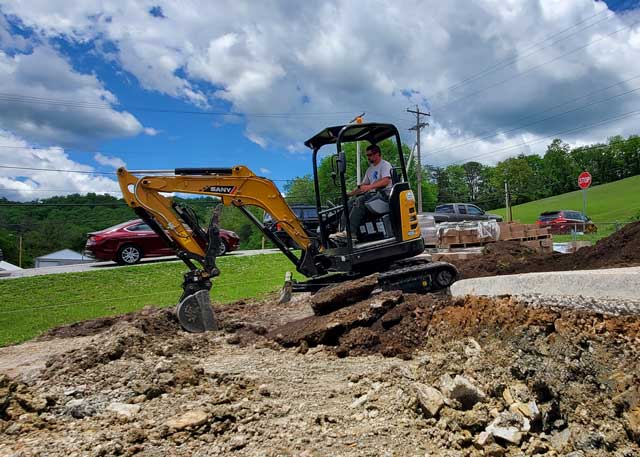Comprehensive Excavation Approaches: Understanding the Principles for Success
The careful preparation, specific implementation, and meticulous attention to detail required in excavation tasks demand a thorough strategy that includes various essential aspects. The true mastery lies not simply in comprehending these fundamentals however in effortlessly integrating them to navigate the intricacies of excavation projects with skill.
Understanding Excavation Project Planning

Effective excavation jobs are developed on the foundation of comprehensive and thorough preparation. The first stage of any kind of excavation task is the planning phase, where critical choices are made that can significantly affect the end result of the project. Throughout this phase, it is important to collect all appropriate details concerning the site, including topographical surveys, soil make-up, and any possible risks that might exist. Comprehending the job budget, range, and timeline constraints is critical for creating a detailed excavation plan that ensures the job's success.
One secret aspect of excavation job planning is the development of a thorough timeline that lays out the sequence of due dates, milestones, and activities. By very carefully thinking about all these aspects during the planning phase, excavation projects can be implemented successfully and successfully, leading to successful end results - lancaster excavation.
Soil Analysis and Website Evaluation
Conducting extensive dirt evaluation and site analysis is a critical action in the preparation stage of any excavation project. Soil evaluation entails figuring out the composition, structure, and properties of the dirt at the excavation site. This information is critical for understanding the dirt's bearing ability, moisture content, and potential for disintegration, which are crucial consider identifying the excavation approaches and equipment needed for the task.
Site evaluation goes beyond dirt evaluation and encompasses a broader analysis of the total website problems. This examination consists of determining any kind of potential dangers, such as underground utilities, environmental problems, or unstable surface, that might affect the excavation process. By extensively reviewing the website, job supervisors can establish efficient excavation methods that focus on security, effectiveness, and environmental management.
Making use of innovative technologies like ground-penetrating radar, dirt sampling, and drone surveys can boost the accuracy and efficiency of dirt evaluation and website evaluation. Spending time and resources in these initial steps can ultimately save time and prevent pricey delays or issues during the excavation procedure.
Tools Choice and Use
Effective excavation jobs rely greatly on critical tools choice and usage to guarantee ideal efficiency and performance. Picking the appropriate devices for the work is vital in optimizing efficiency and lancaster trenching decreasing downtime. Aspects such as the type of soil, depth of excavation, and project extent play a significant function in identifying the most suitable tools for the task at hand.

In enhancement to choosing the proper tools, appropriate application is crucial to job success. Operators must be educated to handle the devices securely and successfully - dump truck companies in ohio. Routine upkeep checks and timely repair work assist stop breakdowns and ensure consistent performance throughout the project
Precaution and Laws Conformity
In the world of excavation projects, focusing on safety measures and compliance with policies is critical to ensuring a safe and legally sound operational setting. Precaution include a variety of practices, including performing extensive site assessments, applying appropriate signs and barriers, and giving ample safety training for all personnel entailed in the excavation procedure. Adherence to regulations, such as OSHA requirements in the USA, makes certain that the excavation project fulfills the essential criteria to safeguard employees, bystanders, and the surrounding setting.

Tracking Progression and Adjusting Strategies
How can project managers properly track the innovation of excavation jobs and adapt their methods appropriately to maximize end results? Monitoring progress see this is important for making sure that excavation tasks remain on track and fulfill target dates.

Conclusion
In verdict, understanding the basics of comprehensive excavation techniques is important for the success of any kind of job. By recognizing job planning, evaluating dirt and site conditions, choosing ideal equipment, following safety and security policies, and keeping an eye on progress, task managers can make certain a smooth and efficient excavation procedure. Carrying out these methods will certainly bring about effective end results and decrease prospective risks or obstacles during the excavation project.
The first phase of any kind of excavation job is the preparation phase, where critical decisions are made that can substantially influence the end result of the task. Comprehending the job timeline, extent, and budget restrictions is essential for producing an extensive excavation strategy that ensures the task's success.
How can predict supervisors properly track the innovation of excavation tasks and adjust their techniques appropriately to enhance outcomes? By carefully monitoring progression and being prepared to adapt methods, project supervisors can improve the general success of excavation projects.
By recognizing task planning, evaluating soil and site conditions, picking appropriate devices, complying with safety policies, and keeping an eye on progress, job managers can make certain a efficient and smooth excavation process.
Comments on “Inexpensive Lancaster Excavation - Top Quality Excavation at Competitive Prices”